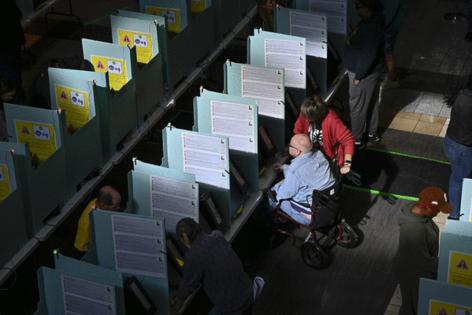Editorial: Ranked-choice voting hits the wall
Published in Op Eds
Is ranked-choice voting a fad — like the pet rock or streaking — destined to fade into the fog of history? It appears that way, if election results from across the country are any indication.
On Tuesday, Nevadans by a 54-46 margin turned away Question 3, a state constitutional amendment that would have mandated open primaries and imposed a system of ranked-choice voting. The referendum narrowly passed in 2022 but needed to be approved twice to become law.
Supporters of the proposal emphasized the advantages of opening party primaries to allow independent voters to participate in the selection of Democratic or Republican candidates. Yet their cynical and misleading campaign ads virtually ignored the second half of the equation, a radical upheaval of traditional voting practices.
Under ranked-choice voting — used in two states and a handful of municipalities — as many as five candidates may advance to the general election. Voters must then rank the candidates in their order of preference. If nobody in the race earns a majority of first-place votes, the candidate with the least support is eliminated and each voter’s rankings are then adjusted. The process repeats itself until one candidate earns a majority.
Proponents argue that ranked-choice empowers voters at the expense of party bosses and forces candidates to build a broader base of support, campaigning toward the center and discouraging the scorched-Earth, bare-knuckles approach that has become so common in this divisive era. But there’s been no evidence that this has been the result in the limited jurisdictions that currently use this approach.
Instead, ranked choice has led to delayed results and an increase in exhausted or spoiled ballots. It increases the chances of voter mistakes. It sows confusion and is susceptible to special-interest manipulation. Election officials in places with ranked choice have been forced to spend millions on voter “education” campaigns to mitigate against its complexity.
But the movement hit the wall this week.
Ranked-choice voting went down in flames, not only in Nevada, but in six other states. Voters in Idaho, Arizona, Colorado, Montana, Oregon and South Dakota all took a pass, most by overwhelming margins. In Missouri, voters banned ranked-choice voting by a 69-32 count. In Alaska, where a ranked-choice voting initiative passed narrowly in 2020, a repeal effort was leading with 97 percent of the vote tabulated.
Ranked-choice voting is a convoluted solution in search of a problem. And voters across the land aren’t buying.
©2024 Las Vegas Review-Journal. Visit reviewjournal.com.. Distributed by Tribune Content Agency, LLC.




























































Comments